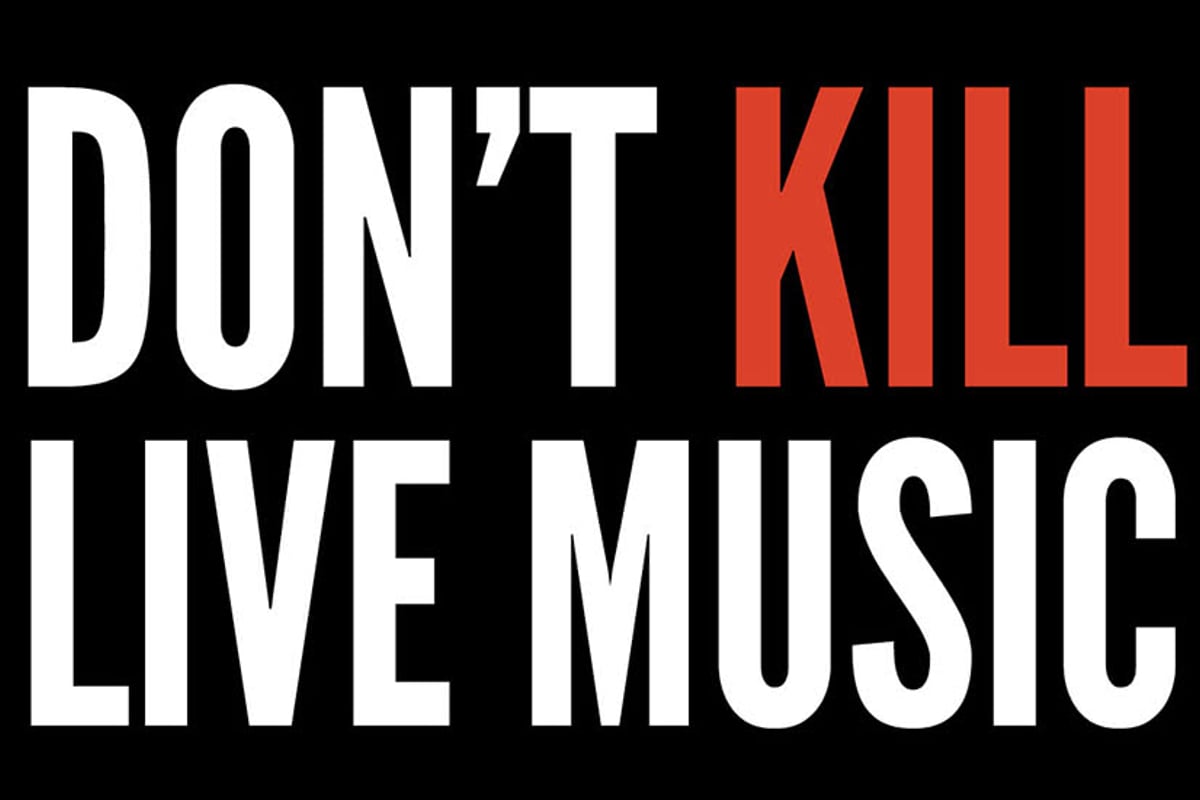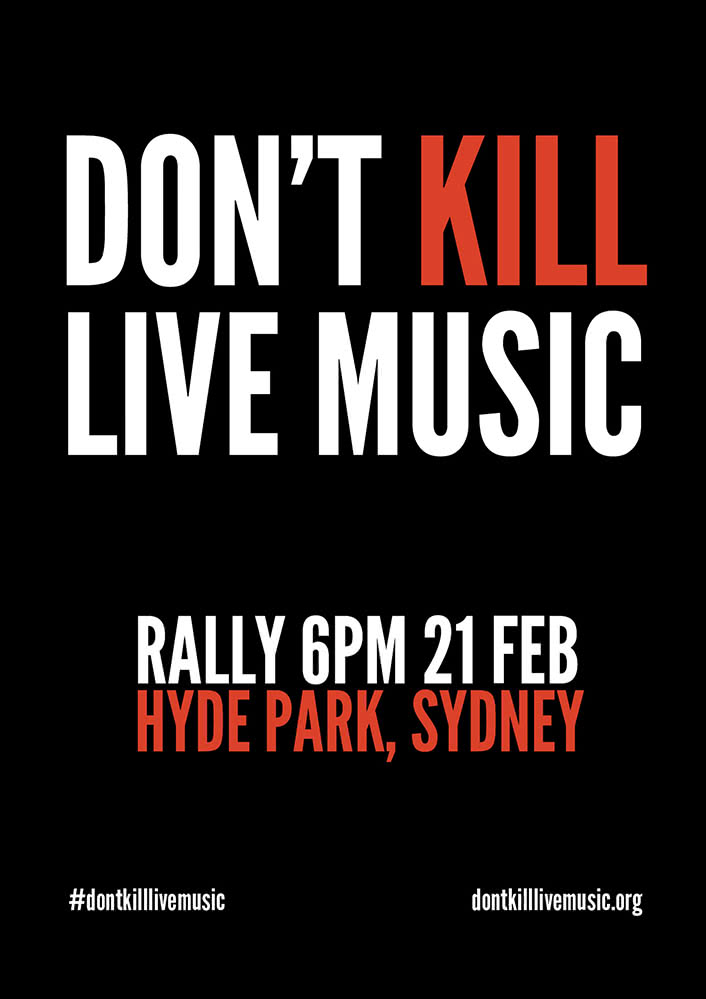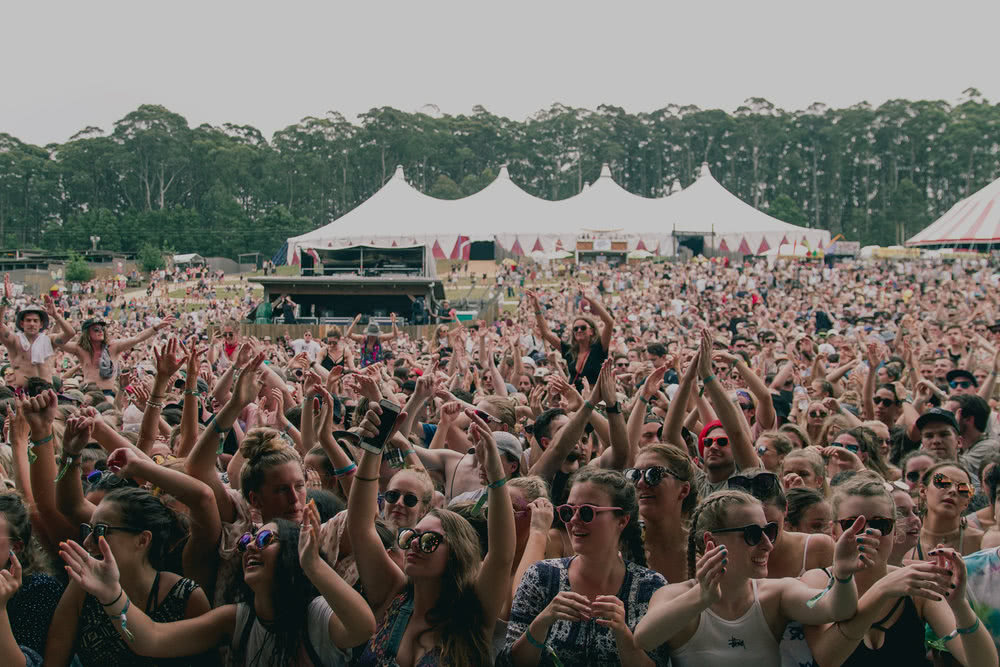NSW music festival licensing regime: The ultimate primer

First, the lockouts. Now festivals. These are nervous times for music fans in Sydney and across NSW, with harsh new licensing conditions set to be applied to festivals from March 1. Two events have already buckled under the weight of ballooning costs associated with those rules, which are intended to keep folks safe and alive. The LPA spelled out their concerns earlier this week: “Consultation with industry has been absolutely woeful and whole sections of our industry are now being destroyed by a knee jerk response from a government that couldn’t care less.” Many other promoters and artists are singing from the same page.
If you work in music, or you just love the stuff, there’s no bigger story bubbling away right now.
And the story isn’t finished.
Next Thursday, Feb. 21, live music supporters will gather at Sydney’s Hyde Park for the Don’t Kill Live Music Rally, almost nine years to the day since the SLAM rally took to the streets of central Melbourne. Its organisers are hoping for a similar result.
Put on the kettle, get settled. Here’s the ultimate primer to what’s happening in festivals-land in NSW, collated by the team behind the Don’t Kill Live Music Rally and republished in full below.

What’s happening
• Officially the industry has been told the music festival liquor license begins on March 1st. The new regulations are still being written. The industry has been told to comply with the proposed requirements before they have even been made into laws (as either a Liquor Regulation amendment or a license condition), which is an abuse of power by ILGR.
• Impacts all music festivals in NSW excl. Tamworth Country Music Festival and Sydney Festival, which have received exemptions for unknown reasons without this being justified as being within the public interest, or by way of a safety case about the risks associated with those events, and potentially ignoring requirements of competitive neutrality in the provision of goods and services by the public sector.
• Music festivals are currently defined by Liquor and Gaming as:
o Over 2000 capacity
o Multiple music acts
o More than 5 hours in duration
o A festival where music is the focus, not secondary activity
o Not a concert (no more than 2 headliners & 2 support acts)
• 90-day process (you must apply no less than 90 days out from your event – this does not support the financial model of the music industry, which requires multimillion-dollar deposits are paid for artists and production services sometimes 6 months prior to an event. This introduces catastrophic regulatory risk into the sector and into the approval process, where an application for approval is declined, and deposits forfeited, the capital used to host events will be destroyed. If ILGR declines approval for an event on one occasion it will bankrupt most events, meaning that their businesses will not survive.
• Previously Liquor and Gaming only approved a festival’s liquor license. Under the new regulation they will have regulatory oversight of all other safety issues at a festival.
• As part of this new license application, festivals must provide extensive detail on all operational components of their festival including security and harm-minimisation.
• Liquor and Gaming NSW can request further clarity or attention on certain components of a festivals management plan.
• The license applications will be assessed by an inter-agency committee of health, police and Liquor and Gaming.
• Liquor and Gaming has provided an indicative risk matrix, which places festivals in either low or high-risk categories.
• The conditions and requirements of a high-risk license are more onerous and more expensive than a low-risk profile.
• The risk matrix is only indicative – Liquor and Gaming will make individual determinations on all license applications.
• Police and Health will set conditions as part of each license – including user-pays policing requirements, on-site ambulance requirements and other harm-minimisation requirements such as chill-out spaces.
User-pays policing
•Through this process, police are able to set a user-pays policing requirement as a condition of the festival receiving its license. This means, that unless the festival agrees to the police bill, they will be denied their festival license.
• There is currently no method available to festival organisers to query these fees or be provided any transparency or justification for these fees.
• This also applies to user-pays medical such as on-site ambulances.
New license fees
• Liquor and Gaming NSW are proposing a new licensing fee to help cover the administrative burden being imposed by the new licensing system.
• This will be scaled according to risk, but currently proposed to be somewhere between 60 cents and $2 per ticket sold – these amounts are yet to be finalized but ILGR presented these values as indicative of likely fees.

The New Festival License – Some Of Our Concerns
1. These new laws are amendments to the current liquor licence. There has been no new legislation made. It will be regulated by the Liquor and Gaming Authority (ILGA), a body that has no in-depth understanding of the music industry. They are a group tasked to regulate liquor & gaming. The new amendments are not within the intent of parliament when passing the original legislation, and scope of powers within the Liquor Act.
2. By making an amendment to old legislation, the government is not doing its due diligence on the proposed changes by way of a regulatory impact statement (RIS). A RIS is required by the Subordinate Legislation Act 1989 for all new significant laws which are not amendments. Because the proposed changes affect an industry with a Gross Value Added (GVA) economic contribution of 1.8 billion dollars to the NSW economy, the changes should be considered and a significant reform and completely new legislation should be drafted and considered.
3. The case for making new laws has not been demonstrated by way of assessing the benefits and costs that will occur if new regulations are rolled out. Although new regulations have been made it has not been demonstrated that the laws will increase public safety or reduce harm. This should be demonstrated by way of a Regulatory Impact Statement (RIS). A RIS will also take into consideration the additional costs, mechanisms for approval, and broader economic implications of the new laws to event organisers, the resources it would take from other stakeholders like health and police, how that would impact the community during high use times as a result, and whether the industry would survive the implementation of new laws. It would also assess how effective their proposal will be to achieve their goals.
4. A RIS will also assess whether diverting medical and policing resources away from other demands in NSW will cause negative impacts upon those places e.g. in responding to emergencies at peak times, or in rural settings with highly constrained resources (e.g. some rural towns only have one ambulance. It should be assessed what happens to the rest of the community if the law requires that ambulances be on permanent stand by at a music festival, and whether NSW Health has the capacity to deliver of mandator requirements of the new music festivals regulation)
5. There has been no financial modelling to assess the economic impact of these changes on small events. Or on regional areas who rely on these events for significant financial injections into their communities.
6. This process has led to an interagency assessment committee that includes NSW POL, NSW Health, that is overseen by Independent Liquor and Gaming Authority (ILGA).
7. There has been no clear indication from ILGA or the NSW Govt as to how the inter-agent assessment committee will regulate the restrictions placed on festivals.
8. These new powers are broadly discretionary, and effectively give NSW Police and ILGR plenary powers – decisions are being made at a state level and will be implemented locally with operational staff at the NSW Health Local Health District and NSW Police Local Area Command level. The decision-making power is vested in a person who is not on the ground and will not comprehend local conditions and whether a decision to approve an application or Event Safety Plan is appropriate to local field conditions. There has been no policy developed to provide checks and balances to this discretion, so that decisions are made fairly and consistently across the industry and appropriate to local conditions.
9. The approvals mechanisms do not contain an effective administrative review, merits review, or judicial review provision. If an adverse decision outcome is reached against an application by a festival, there is no timely dispute resolution mechanism, and no guarantee of service by ILGR. Existing administrative appeals, merits review, and judicial review paths are impractically given the timeframes a music festival occurs within. Appeals against decisions and litigation following an adverse decision will not be heard until after an event has been unnecessarily cancelled by organisers if a decision by ILGR has not been made correctly. The events cannot generally be rescheduled like other forms of development. This means that future events will not proceed despite any administrative appeal outcome, after significant impacts have imposed upon the sector by the regulatory authority.
10. The risk assessment matrix set up by ILGA is not based on evidence or data. Risk assessments run on the current risk assessment matrix on both The Illawarra Folk Festival and Hillsong Worship and Creative Conference came back rendering both events as high risk. Which would require both to have user pays ambulances on site for the duration of their events and they would both need to hand out drug education material and messaging to their patrons, among other things.
11. In consultation meetings ILGR have stated that they are willing to set aside risk assessments ratings created by their own risk assessment process and substitute lesser requirements if they deem it appropriate. No framework has been provided as to how ILGR would do this. This is not a fair and transparent process and places the granting of music festivals licencing at high risk of corruption.
12. There is no certainty and stability provided as to how user pays policing costs are being provided, or the methodology of how the level of policing effort and associated costs are being calculated and whether this is aligned with the NSW Police Force Cost Recovery and User Charges Policy .
13. We are concerned that the NSW Police Commissioner has been directed by the NSW Government Executive to use the tactic of increasing user pays policing charges not for public safety reasons or to meet objectives of the Police Act 1990, but to achieve political objectives for the NSW Government Executive. This is an abuse of power. NSW has excessively increased user pays policing costs during 2017-18, by 4-fold for some events despite no serious incidents or deaths at these events. This is being used as a de facto mechanism to decline approvals for an event, even though it falls outside of the ILGR licensing system, or existing approvals under the Environmental Planning and Assessment Act 1979. Through our experience as national operators in other Australasian jurisdictions, we know we are not being charged increased user pays policing fees outside of NSW, and that we face the same public safety and event issues in other Australian jurisdictions. We are concerned that the NSW Government is not abiding by the agreement made by the Australasian Police Ministers’ Council, Principles for the Application of User Pays Policies for Police Services, 1995 – otherwise we would have seen increase in the user pays policing costs.
14. We are concerned with the lack of transparency and methodology being applied in the calculation and charging of supplementary policing services, the regulatory system must be amended so that certainty and predictability is provided to the industry and that NSW Police can no longer use policing charges as way to shut down events last minute and destroy our industry. We need the ability to plan for user pays policing charges far in advance, prior to events going on sale so that any costs charged may be incorporated into our event financial models and ticket prices.
15. We are concerned that a new licence has been created that adds unnecessary complexity to the regulation of the Liquor sale and consumption and does not contribute to the responsible development of related industries such as the live music, entertainment, tourism and hospitality industries in accordance with the objectives stated at section 3 of the Liquor Act 2007.
16. ILGR does not have the technical expertise and skilled enough staff to assess the new licenses and must defer for advice to other regulatory bodies – this is convoluted interagency approach and will generate massive delays. At present ILGR does not maintain reasonable timeframes of response to business as usual activities such as answering emails and granting licenses. This work is better performed by local councils who coordinate with the local NSW Health and NSW Police on a daily basis and are also responsible for approving festivals development applications under the Environmental Planning and Assessment Act 1979 which are still required.
17. The proposed licensing fees are excessive and will put most small medium sized festivals (“SMFs”) between 2000-5000 capacity out of business as they have a reduced capacity to absorb extra licensing fees, administrative costs and potentially excessive regulatory requirements. This means that the regulatory model will eliminate SMFs form the sector, but large events will remain. SMFs generate innovation in the sector and are a crucial part of providing cultural innovation and pathways for emerging artists, these pathways support larger festivals by providing a breeding ground for culture, and also for cultural export internationally for these artists. By making SMFs financially unviable, the whole sector faces increased costs and financial risks as artists will relocate from NSW as higher income can be received elsewhere. This increases the relative cost of a performance in NSW by adding extra logistics costs to NSW events and festivals, and places NSW at a competitive disadvantage in producing live music and culture. This will kill live music.
Register here for the rally and sign the petition here.
This article originally appeared on The Industry Observer, which is now part of The Music Network.






























